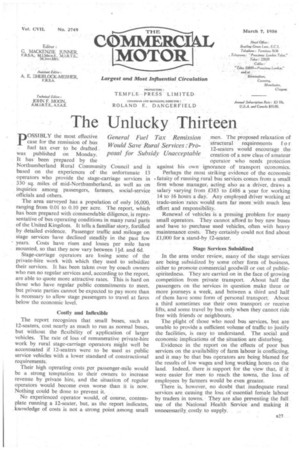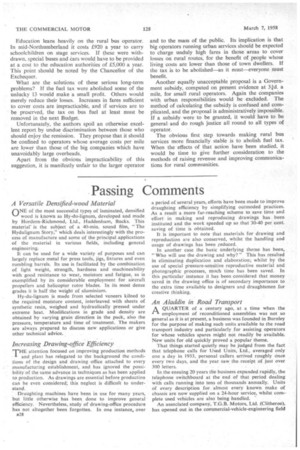The Unlucky Thirteen
Page 37

Page 38

If you've noticed an error in this article please click here to report it so we can fix it.
pOSSIBLY the most effective case for the remission of bus fuel tax ever to be drafted was published on Monday. It has been prepared by the Northumberland Rural Community Council and is based on the experiences of the unfortunate 13 operators who provide the stage-carriage services in 330 sq. miles of mid-Northumberland, as well as on inquiries among passengers, farmers, social-service officials and others.
The area surveyed has a population of only 16,000, ranging from 0.01 to 0.10 per acre. The report, which has been prepared with commendable diligence, is representative of bus operating conditions in many rural parts of the United Kingdom. It tells a familiar story, fortified by detailed evidence. Passenger traffic and mileage on stage services have declined steadily in the past few years. Costs have risen and losses per mile have mounted, so that they now vary between 11-d. and 6d.
Stage-carriage operators are losing some of the private-hire work with which they used to subsidize their services. It has been taken over by coach owners who run no regular services and, according to the report, are able to quote more attractive rates. This is hard on those who have regular public commitments to meet, but private parties cannot be expected to pay more than is necessary to allow stage passengers to travel at fares below the economic level.
Costly and Inflexible The report recognizes that small buses, such as 12-seaters, cost nearly as much to run as normal buses, but without the flexibility of application of larger vehicles. The rate of loss of remunerative private-hire work by rural stage-carriage operators might well be accentuated if 12-seaters were to be used as public service vehicles with a lower standard of constructional requirements.
Their high operating costs per passenger-mile would be a strong temptation to their owners to increase revenue by private hire, and the situation of regular operators would become even worse than it is now. Nothing could be done to prevent it.
No experienced operator would, of course, contemplate running a 12-seater, but, as the report indicates, knowledge of costs is not a strong point among small men. The proposed relaxation of structural requirements f o r 12-seaters would encourage the creation of a new class of amateur operator who needs protection against his own ignorance of transport economics.
Perhaps the most striking evidence of the economic fatuity of running rural bus services comes from a small firm whose manager, acting also as a driver, draws a salary varying from £383 to £486 a year for working 14 to 16 hours a day: Any employed driver working at trade-union rates would earn far more with much less effort and responsibility.
Renewal of vehicles is a pressing problem for many small operators. They cannot afford to buy new buses and have to purchase used vehicles, often with heavy maintenance costs. They certainly could not find about £1,000 for a stand-by 12-seater.
Stage Services Subsidized In the area under review, many of the stage services are being subsidized by some other form of business, either to promote commercial goodwill or out of publicspiritedness. They are carried on in the face of growing competition from private transport. About half the passengers on the services in question make three or more journeys a week, and between a third and half of them have some form of personal transport. About a third sometimes use their own transport or receive lifts, and some travel by bus only when they cannot ride free with friends or neighbours.
The plight of those who need bus services, but are unable to provide a sufficient volume of traffic to justify the facilities, is easy to understand. The social and economic implicaticms of the situation are disturbing.
Evidence in the report on the effects of poor bus services on the availability of farm labour is conflicting, and it may be that bus operators are being blamed for the results of low wages and long working hours on the land. Indeed, there is support for the view that, if it were easier for men to reach the towns, the loss of employees by farmers would be even greater.
There is, however, no doubt that inadequate rural services are causing the loss of-essential female labour by traders in towns. •They are also preventing the full use of the National Health Service and making it unnecessarily, costly• to supply. Education leans heavily on the rural bus operator. In mid-Northumberland it costs £920 a year to carry schoolchildren on stage services. If these were withdrawn, special buses and cars would have to be provided at a cost to the education authorities of £5,000 a year. This point should be noted by the Chancellor of the Exchequer.
What are the solutions of these serious long-term problems? If the fuel tax were abolished some of the unlucky 13 would make a small profit. Others would merely reduce their losses. Increases in fares sufficient to cover costs are impracticable, and if services are to be preserved, the tax on bus fuel at least must be removed in the next Budget.
Unfortunately, the authors spoil an otherwise excellent report by undue discrimination between those who should enjoy the remission. They propose that it should be confined to operators whose average costs per mile are lower than those of the big companies which have unavoidably large overheads.
Apart from the obvious impracticability of this suggestion, it is manifestly unfair to the larger operator and to the mass of the public. Its implication is that big operators running urban services should be expected to charge unduly high fares in those areas to cover losses on rural routes, for the benefit of people whose living costs are lower than those of town dwellers. If the tax is to be abolished—as it must—everyone must benefit.
Another equally unacceptable proposal is a Government subsidy, computed on present evidence at 30. a mile, for small rural operators. Again the companies with urban responsibilities would be excluded. The method of calculating the subsidy is confused and complicated, and the proposal is administratively impossible. If a subsidy were to be granted, it would have to be general and do rough justice all round to all types of operator.
The obvious first step towards making rural bus services more financially stable is to abolish fuel tax. When the effects of that action have been studied, it would be time to give further consideration to the methods of raising revenue and improving communications for rural communities.
























































































































